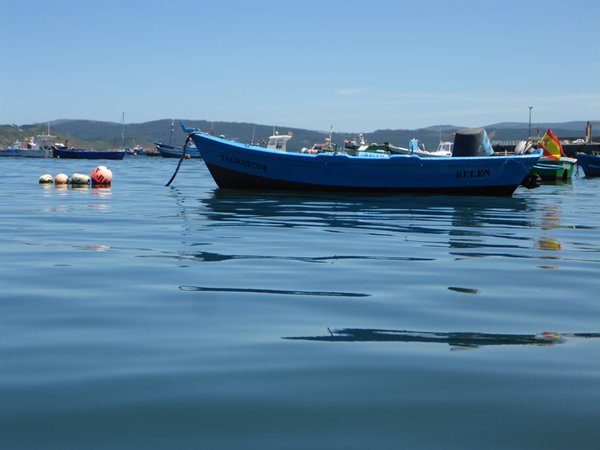To the end of the Earth – Finisterre Faro
42:54.56N 9:15.36W
Sunday July 5th dawned clear bright and windless. Two arrival procedures are becoming a noticeable pattern in our cruising. Firstly the need to see Zoonie through a first night at anchor especially if there is a fresh wind, before venturing ashore and leaving her. Secondly placing into the chartplotter waypoints for our next destination while having just arrived at the current one. These are ways of building confidence and preparation for any event.
People of our age and situation do various things to fill their time; take up watersports, enrol with the U3A, spot trains, twitch birds, but we find lighthouses (or so it seems) as we circle the globe. They seem like an interesting target to walk to and then the pleasure of walking back, usually to a friendly looking bar, fills half a day nicely.
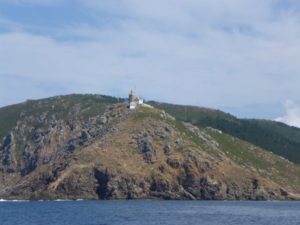
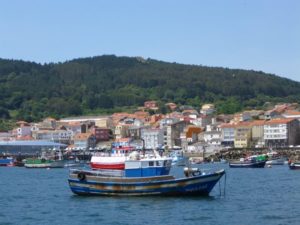
It was a gentle uphill climb from the pretty harbour village to Finisterre Faro standing proud and prominent above the ocean. There were only a handful of people there and I was surprised by the atmosphere of quiet reverence that was tangible. People had left personal, colourful items there as if to keep a material connection with the beneficence of the place to keep mariners safe. Granite blocks had iron rings fixed to them that led over the rocky edge, maybe to facilitate rescue and some people had fixed locks to them to forever seal their love of the people named on them. A communication aerial made of angular steel struts had been climbed many times and scarves, handkerchiefs and ribbons flew from all heights. It reminded me of temples of Buddhist worship high in the Himalayas with colourful flags flying.
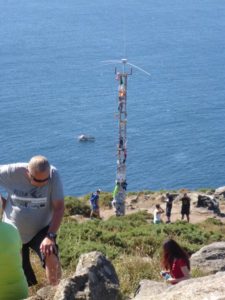
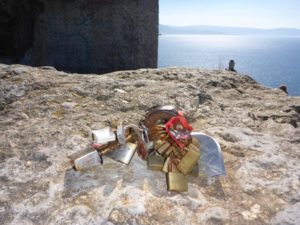
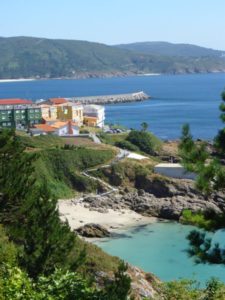
Beer, gambas (prawns) and bread made up our lunch then the next layer of tan was carefully applied in the cockpit in the afternoon.
The next morning was grey, raining and the wicked wind had turned south. But this time we could not let it stop us as there was no sanctuary in the form of a marina at Finisterre and another blow was on its way. We headed off again under motor and in the fog, rocks and fishing boats popping up all over the chartplotter and radar screens (worry not, we had planned a route to account for the rocks!)
Four and a half hours later we tied up in Portosin Marina, where we shall stay for today, do some washing, catch up on internet matters etc.
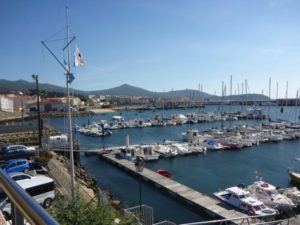
Yesterday eve we walked into Portosin to find a once attractive fishing port of typical Galician homes, with glazed balconies, wider upper stories and pan tiled roofs completely overshadowed by many ugly concrete blocks of apartments built in some frenzied seventies expectation of boom years when people could afford holiday homes and maybe received grants that fuelled building without planning or forethought.
But they got it right with the Yacht Club. Of pleasant design to suit visitors and locals of all ages with emphasis not just on marine services but also teaching sailing and ball and court games. It was well used and appears to have thrived since the seventies with glass cupboards full of awards for this that and the other. The best part was the soft sofas and views from the bar/dining room windows.
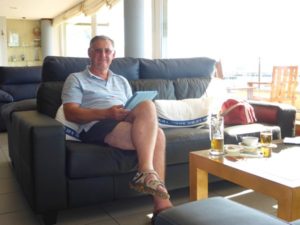
As I write the wind is drying our washing nicely where it is fixed onto temporary lines with wooden pegs that grip the best. Can’t have our undies flying over towards the fishing wharf! I just had a scare. As I was tapping away suddenly a loud hissing noise pushed out of the sailing clothes locker as the bright orange lungs of my life jacket filled with gas. Don’t know what caused it but I was reassured it would do the same if it had to in earnest, with me in it.
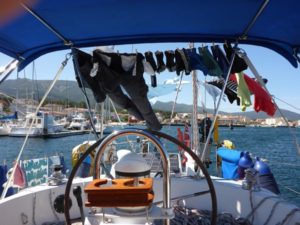
Rob is presently tightening up the new stainless steel standing rigging which after a few blows has stretched as Dave at Allspars in Plymouth said it would. Two turns on the bottle screws of the long lengths that go to the mast top and slightly less on the shorter lengths that go to the two sets of cross trees, which are fixed like branches to either sides of the mast at two different heights.
Big fishing boats, adorned with tiaras of aerials and dishes leave late evening for their nights of fishing (at least I think that’s what they are doing, could be the garden shed analogy) and return to shed their catch into the waiting mouths of delivery lorries, pass their nets onto the quay and refuel. The little vessels, sometimes with just two men on board, depart to fish in the safety of daylight.
On to the Spanish Rias 12 Jul 2015.
Portosin to Sta Uxia de Reveira in Ria de Arousa
42:33.75N 08:59.26W
That night we lay awake listening to the wind as it started at the head of the river, gaining momentum as it sped towards us and hurled itself around the corner up river from us sending bumpy waves into the marina. Zoonie pitched up and down pulling taut on her bowlines and slapping her stern like a whale does with its fluke. Sleep was not to be had. So, like the friendly Dutch couple who also had a restless night, we left this fine marina with its beautiful clubhouse and welcoming staff and set off under genoa alone SW towards Ria de Arousa.
Offshore the wind dropped away lacking the steep river sides to funnel it, so on went the engine once more and we dropped anchor in 7 metres off the fine beach near Riveira Harbour. Many folk on the beach were enjoying the hot sunny evening and we pledged to do the same the next day after a good night’s sleep.
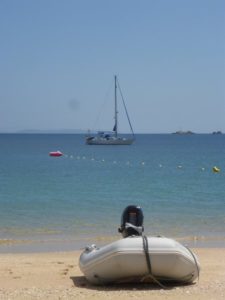
A night which lasted till 5.00am when the wind picked up and found us ghostlike in our white towelling robes hanging over the anchor chain wondering if we were dragging. What started off as a grey day just picked up from then on. We motored the tender down the little safety route between red and green buoys (to keep us separate from swimmers) to the beach where a charming young Spanish lifeguard helped lift the dinghy above the high water line and promised to look after it while we were away, using that international language of flapping hands and mental understanding.
Riveira is home to deep sea fishing trawlers as well as the boats I have described in other blogs. The fish quay area was very busy with white refrigerated articulated lorries waiting to be loaded and the grand style and pleasing design of the town architecture suggested a lucrative heritage from the sea.
The pedestrian precinct parallel to the main harbour road was full of classy shops, swimwear emporiums and a municipal market selling mostly locally caught fish and meat. We bought two sea bream, (dorada), 6 sardines, (sardinas) and 2 handfulls of goose barnacles or percebes in Spanish. These latter are exported all over the world from here and are a delicacy costing up to 70 Euros a kilo. In the UK we sweep them back into the water after they have been high pressure hosed off the hulls of yachts!
The complimentary Tapas here is to be recommended. Strips of local cheese, delicious olives and crisp biscuits with thinly sliced sausage and hams with each round. I passed on the meat as I am historically a vegetarian but due to my bones flagging through age I have recently and uncomfortably started eating fish. I don’t think it will last. After two beers we’d had lunch too! Another charming young Spaniard sorted out our Wi-Fi at his bar and we caught up on home news.
We lounged on the empty beach in the afternoon, most people coming down later when the sun has started to descend. A refreshing swim followed by a walk and then back to the boat for a challenging supper. The lady at the fish counter inferred the goose barnacles needed to be popped into boiling water for just a few seconds. We could then open them in different ways. I tried prizing open the beak so the pale orange cheeks and feeding filaments could be eaten with the tubelike body. Rob separated head from body and just ate the tubes. They were tender, delicate and slightly salty and we enjoyed them, but we are not connoisseurs so any further description would be pompous. We grilled the sardines on our cast iron griddle and they were yummy.
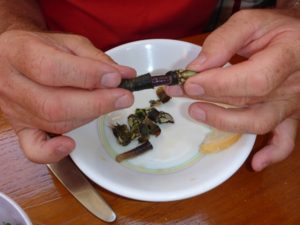
After all the culinary exploits the sink needed a little help in draining in the evening. As I delved into the floor cupboard for the friendly plunger Rob said “I like to see my woman on her knees”. He then saw an alternative use for a sink plunger.
That night there was virtually no wind. Zoonie barely moved. We were in for a peaceful night at last. Or so we thought. I was awoken just before 4.00am to the sound of a powerful diesel engine thumping very close by filling our cabin with light, fumes and the sound of voices. My first thought as I went to stand on our berth and pop my head out of the hatch above was “That’s a bit close for fishing matey”. The sight of the dark hulled police patrol boat with its two swanky angled white dashes near the bow just a few feet away was not at all threatening as the three men were aiming spotlights at Zoonie’s stern trying to make out her name. “Zoo, Zoo?” “Zoonie,” I called smiling, “She’s called Zoonie and we’re English.”
“Ah si, Ports?” “She’s registered in Portsmouth”. Fortunately that was all that was needed, they accepted we were not people or drug smuggling and moved gently away towards the other anchored yacht leaving us in peace.
